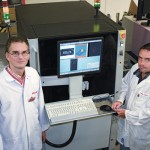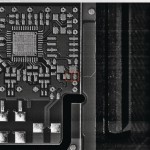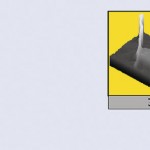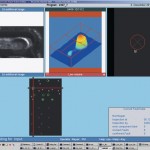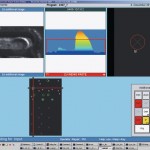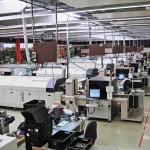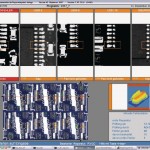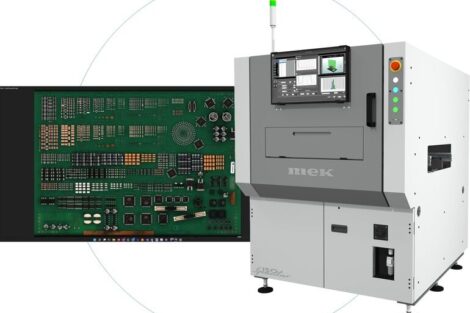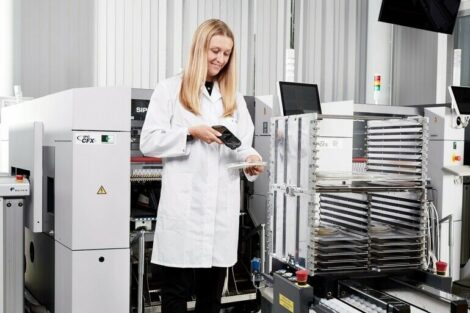Smyczek GmbH & Co. KG is a manufacturer of high-quality components and devices. Customers bring product ideas to Smyczek and the company manages the overall design, production and assembly. The key to success is flexibility and close cooperation between Smyczek and its customers. Maintaining the highest product quality and delivery reliability is a matter of course for Smyczek, even for the smallest lot sizes. Comprehensive knowledge and experience in SMT production is the basis of this principle.
Viscom, Hannover (Germany) & Smyczek GmbH & Co. KG, Verl (Germany)
Being a mid-sized and mostly regional company, the production is always up to date technologically. Roland Smyczek and Michael Schlegel, co-CEOs at Smyczek, make sure of this. They thoroughly follow the latest trends and developments and then apply new technology if the opportunity provides it and if it is economically beneficial. As a result of the CEOs’ forward thinking, a 3-D solder paste inspection has been installed in the production not only to detect paste printing defects but also to illustrate an effective tool for simple process optimization.
Flexible, up-to-date manufacturing
An electronics manufacturing services (EMS) provider, Smyczek GmbH & Co. KG manufactures and assembles electronic components and devices in a 4500m² (45,000 sq ft) facility and with approximately 230 employees. Since 2009, the company has been a member of the Beckhoff group as a specialist for the assembly of PCBs as well as the main supplier for Beckhoff’s automation components. In modern production, due to great flexibility, from 20 to 30 product launches are implemented daily. With 11 SMD lines, the capacity reaches 22 million components each week. This is an increase in 6.5 million components since 2010.
Flexibility and product quality are highly important for the company. Smyczek is one of only a few EMS companies that provides a template laser to reduce the handling time of prototypes and prime series, which results in an average time savings of a day and a half. An AOI system is placed in each SMD line to ensure high assembly quality.
SPI System Application
The application of the 3-D SPI at the company began with a test installation in early 2012. Viscom was looking for a suitable EMS company to evaluate the new inspection system S3088 SPI, in which the Viscom Process Uplink, developed as an innovative production instrument, could be tested. The Smyczek company, being a mid-sized EMS service provider, was particularly interesting because they work with a large variety of very different PCB colors and substances, solder resists, and various template strengths and types — hence, the best requirements for a major knowledge gain. The inspection system was used by Viscom and Smyczek for further optimization. As a result, the technology partnership of both companies was further expanded. Although Smyczek initially expressed skepticism over the usefulness, it always remained interested in new technological solutions. Therefore, both companies quickly agreed on the experimental installation.
Due to space issues, the SPI system was not operated in-line at first, but instead was used for off-line applications in a separate inspection station with automatic loading/unloading of the 3-D SPI. Although some reaction time during the process is lost, it still has the advantage of providing measurement results from the entire available production line. Thus, wider spread data can be collected, making the Process Uplink for further process optimization even more effective.
Printer quality inspection made easy
The 3-D solder paste inspection system typically is used to detect defects in paste printing. Electronic assemblies that do not meet specified criteria are sorted and reconditioned immediately after the solder paste is printed. This saves unnecessary expenses by not further processing defect electronic assemblies. Now in use at Smyczek, the 3-D SPI allows for the best possible adjustment of the paste printing process right from the beginning. All essential 3-D features such as volume, height and form are recorded and checked, as are surface area, displacement and smearing. Even smallest pad sizes are analyzed quickly and reliably.
“With the new 3-D SPI system we can now evaluate the printing result of the paste much more precisely, as opposed to only with the 2-D camera, which is integrated in the printers, or with visual inspection,” emphasized Smyczek’s CEO Michael Schlegel. “After the first or second print it can be seen what is to be optimized to really meet the process requirements.”
Another interesting outcome, discovered with the application of the S3088 SPI, affected the cleaning cycle. “We found that we were cleaning too often,” explained Schlegel. “After cleaning, every first or second print result was conspicuously bad. It was a surprise for us that cleaning leads to a much worse print, which does not return to normal until later. So now, based on that fact, we intend to clean much less frequently.”
Process optimization with Process Uplink
Within the course of the test installation, the Viscom Process Uplink also was installed. To accomplish this, the data from the SPI and the post-reflow AOI are linked and transferred back to the post-reflow verification station. This also includes those analysis results that do not represent clear defects as defined by the defect threshold, but can lead to critical situations because they are on the edge of the good/bad tolerance in terms of solder quality. This entire process quickly provides the operator with a great deal of additional object and process information.
This developed feature provides an effective possibility for those responsible in the production to optimize the SMD process and to use the newly recognized data at the SPI for improved defect detection.
Schlegel explained the functionality and the advantages: “The standard defects limit of ±50 percent typically offered on the market is lacking in practical relevance and rendering it useless because it heavily depends on the actual defect limits of every single component. Furthermore, it is a significant difference if there is a plus or minus deviation, e.g. taking a big component where there could be even plus 100 percent and nothing would happen. But if I have a fine-pitch QFP then I must ensure that the minus deviation is not too large. Having a plus deviation on the other hand most likely will cause a short circuit, which means that the tolerance windows are very different. These are exactly the things that you can learn from the Viscom Process Uplink.”
The Process Uplink is applied at Smyczek to optimize defect limits. Schlegel commented on the usefulness of being able to allocate the AOI result to the particular SPI result. “We now can recognize the relationship between the paste printing result and the real appearance of detects. We can see which defect in the paste printing will actually create a problem at the end. Through frequent product change we can avoid unnecessary defects quite early in the production line, guaranteeing the best product series launch.”
Complete Traceability
In 2010, Smyczek implemented traceability into the assembly. For this, all assemblies were provided with a lasered data matrix code. Now the company wants to expand traceability to the component level. “With the Viscom Uplink, complete traceability to the inspection level is possible,” explained Schlegel. “For critical projects, we now trace not only the post-reflow result but also the respective paste printing result. This provides an even higher knowledge gain. Furthermore, using this program we can transfer all inspection images as a documentation form.” The Uplink provides the entire AOI/SPI defect images pairs.
Schlegel was pleased with the partnership during the experimental installation as well as with having kept the system in use. “The only thing you can call the installation is ‘good.’ Particularly in the beginning of the installation, we needed support. Mr. Beer, the director of product development in charge, always provided us with quick and specific support.”
Zusammenfassung
Die Smyczek GmbH & Co. KG in Verl bei Gütersloh setzt die 3D-Pasteninspektion mit Process-Uplink von Viscom ein. Das Unternehmen ist als mittelständischer EMS-Dienstleister Spezialist für die Leiterplattenbestückung und darüber hinaus auch für die gesamte Fertigung und Montage der Baugruppen. Mit elf SMD-Linien, alle mit einem AOI-System für die Qualitätssicherung ausgestattet, wird eine Maschinenkapazität von 22 Mio. Bauteilen pro Woche erreicht.
La société Smyczek GmbH & Co. KG à Verl près de Gütersloh met en œuvre l’inspection en 3D de la pâte à braser avec le Process-Uplink de Viscom. En qualité de prestataire de services EMS de taille moyenne, l’entreprise est spécialisée dans la réalisation des circuits imprimés, mais également pour la fabrication globale et le montage des éléments de construction. Avec onze lignes SMD, toutes équipées avec un système AOI pour garantir la qualité, on obtient une capacité des machines de 22 millions de pièces de construction par semaine.
Share:


